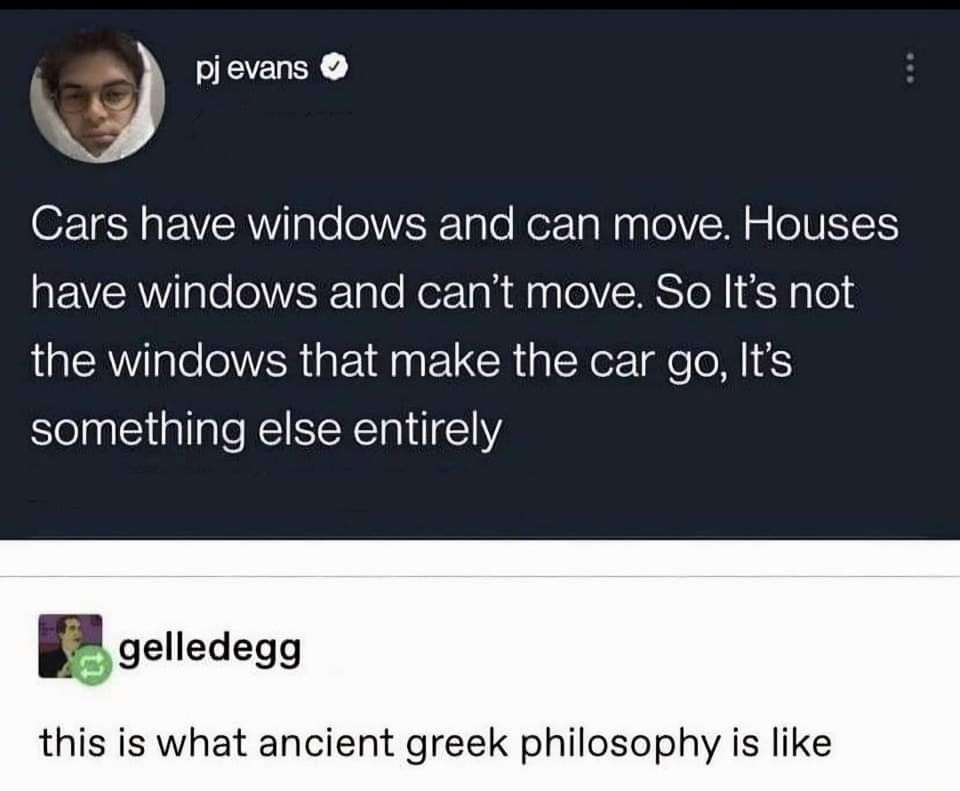this post was submitted on 25 Aug 2024
1503 points (99.0% liked)
memes
11055 readers
5594 users here now
Community rules
1. Be civil
No trolling, bigotry or other insulting / annoying behaviour
2. No politics
This is non-politics community. For political memes please go to [email protected]
3. No recent reposts
Check for reposts when posting a meme, you can only repost after 1 month
4. No bots
No bots without the express approval of the mods or the admins
5. No Spam/Ads
No advertisements or spam. This is an instance rule and the only way to live.
Sister communities
- [email protected] : Star Trek memes, chat and shitposts
- [email protected] : Lemmy Shitposts, anything and everything goes.
- [email protected] : Linux themed memes
- [email protected] : for those who love comic stories.
founded 2 years ago
MODERATORS
you are viewing a single comment's thread
view the rest of the comments
view the rest of the comments

Ducks have wings and can fly. Ostriches have wings and can't fly. So it's not the wings that make the ducks fly, it's something else entirely.
This is what ancient greek philosophy is like
Deep thoughts.
Perfect example on why the reasoning in the OP is rubbish, even if reaching the right conclusion.
An appropriate deduction might be "Cars have windows and can move, houses have windows and cannot move. The presence of windows alone is not what allows the car to move."
Ah, but youre still making unreasonable assumptions that the house can't move. Perhaps the house just chooses not to move.
A fair point - here's a generalisation. W denotes windows, M the ability to move, a and b are two objects for which their possession of windows and ability to move (or otherwise) is known, and x is some other object.
(W(a) ^ W(b)) ^ (M(a) ^ ¬M(b)) -> ¬(W(x) -> M(x))
That works better; the conclusion is practically useless due to the amount of combinations that wouldn't allow the car to move, but at least it's reliable.
Going past that would require messing around with things that don't move until they do, or vice versa. Also known as science.
Previously known as natural philosophy
Not quite. Natural philosophy is important for science, but on itself it lacks a key element - testing things.
(Note that simply trying to deduce how nature works, like the Greek philosophers did, was already natural philosophy. It isn't science though.)
That sounds plausible but is, in fact, kinda a made up distinction you just came up with. People up to and including Isaac Newton used the phrase 'natural philosophy' to describe what they were doing. 'Testing' in any meaningful sense of the word was a part of that more often than not. Even Pythagorean astronomy was implicitly testing things by making predictions of the movement of celestial bodies. So, no, but thanks.
Edit: also worthwhile, I feel, mentioning that a lot of good science is purely observational and involves no direct testing, even of theorems. E.g early paleontology would, I feel, fit into that theme
You're mincing words to not acknowledge the blatant qualitative difference between what those Greek philosophers were doing under the label "natural philosophy", versus what people past Bacon (exemplified in your comment by Newton) were doing.
And, as a result, your comment boils down to an "ackshyually" leading to a clearly idiotic conclusion.
Emphasis mine. Doing it "implicitly" doesn't cut it out; this shit needs to be explicit and systematic. You need to take the bloody window off the car and see if it still moves, then take off the lights, so goes on.
Even when direct experimentation is not possible due to the nature of the subject, you need to formulate a bunch of alternative explanations and find a way to sort them out. i.e. explicitly test shit.
And this is so fucking obvious that I'm not wasting my time further with you. If you're so blatantly ignorant on the scientific method, Wikipedia is a good start.
Mate, first of all: chill. Second of all: me, mincing words? You're the one who's decided the phrase 'natural philosophy' only applies to ancient Greeks. It's literally just what science used to be called. Being very very hung up on a specific definition of a word or phrase and excluding other common usages is not a good basis for an argument. There need have been no argument at all. 'We call it science now' seems to be what you meant, but it's not coming across well
Oh. And you can still do science without a theory. It's called data collection and it is absolutely vital.
Edit: a good example would be Rosalind Franklin's work on the structure of DNA. She did some incredible science with x-ray diffraction which was vital to Crick and Watson's theory of the structure.
Edit X2: also 'doing it implicitly' is totally fucking fine if the result of being invalidated is you create a more refined model of reality. Which is, like, pretty much what the whole thing about astronomy is...
All I know is that the ocean can't fly and geese come from barnacles, so it's not the ocean that makes geese fly.